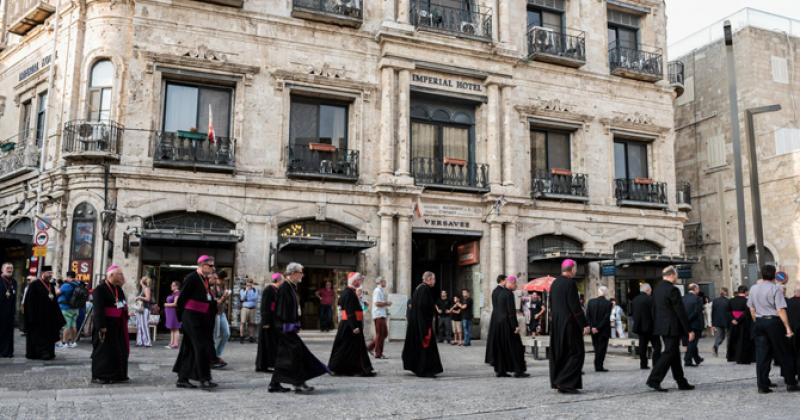The first statement was issued by the Plenary Assembly of the Council of European Episcopal Conferences which convened in the Holy Land (September 11-16, 2015) at the invitation of Latin Patriarch of Jerusalem Fouad Twal. The bishops wanted to meet with the children of the Holy Land to instill the spirit of optimism despite the conflagrated environs. When they arrived there, there were several exigent issues that required a vehement intervention. For on the eve of celebrations marking Eid Al Adha, Al Aqsa Mosque was subjected to daily attacks; the separation wall began "to sneak" into the Cremisan Valley; the Christian schools in Israel have been in a dilemma as they started a strike over two weeks ago. So, what was the reaction of the bishops towards the events taking place in the Arab region whose ability to deal with the central issue, namely the Palestine question which is the clue to several world dilemmas, was incapacitated?
They stated that they expressed their fraternal solidarity with the suffering humans, called for respect of religious freedoms to all people as a fundamental human right, stressed that the solution of the central Middle East problem is the key to solving all the problems of the conflagrated region. They said that the Orient suffers from disputes, schisms and wars at a time when its peoples need justice and stability in its various areas.
They also stressed that dialogue and development are the real way leading to genuine peace, and to guaranteeing equality among the citizens, countries and societies of the Orient whose rich cultural and religious heritage can be conducive to a peaceful life. The bishops hoped that the sensitive situation in the Cremisan region, in particular, might find an appropriate solution respectful of the rights of families, their properties, and of the two religious communities as well as their teaching mission.
The Plenary Assembly of the Council of European Episcopal Conferences in the Holy Land is a major achievement as it reflects a spiritual and moral role for millions of people of this continent which has economic and social influence. Yet, the people of the Orient need practical steps that express solidarity with them. So long that the bishops discussed development, this development cannot be attained as long as political and security situations have not been settled. This cannot be achieved through religious leaders who came on a pilgrimage mission to pray, but through the role of the political leaders who have to pay special attention to the nonpareil disgrace of human dignity.
The second statement was issued by the heads of Churches in Jerusalem, who condemned all threats to change the historical (status quo) situation in Al Aqsa Mosque, its courtyard, and all buildings in the city of Jerusalem. They said that any threat to its continuity and integrity could easily lead to unpredictable consequences which would be most unwelcome in the present delicate political and conflagrated climate.
The statement continued that the Muslims have the full right to have free access to Al Aqsa Mosque and to pray there. They also underlined the prime importance of His Majesty the King’s and Jordan's role in serving as patron over Jerusalem's holy sites and all the Holy Land. They noted that all the worship sites need continuous care and protection to ensure unbridled access based on the prevalent situation that applies to followers of the three Abrahamic religions. The statement reiterated the call of the heads of Churches in Jerusalem on the need to preserve the existing agreed upon status quo governing these sites and the need to respect its citizens.
Furthermore, the statement of the Plenary Assembly of the Council of European Episcopal Conferences in the Holy Land stressed the need to respect religious freedom as a fundamental human right, while the statement of the heads of Churches in Jerusalem stressed the need to ensure free access to the holy places, particularly Al Aqsa Mosque without any side undertaking unilateral changes. Truly, Jerusalem has a special political tang and a unique religious importance, for if no stability prevails there, there will be no stability in the world.
